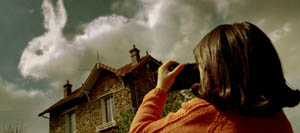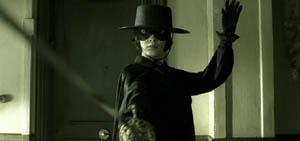|
The hell is this film called, anyway? The box says "Amelie," the title on the film says "Amelie of Monmarte," and the director and all the supplementary features refer to it as "The Fabulous Destiny of Amelie Poulain." Make up your damn crazy foreign mind! 
Whatever this film may actually claim as a proper name, it remains a rarity, in that's a non-English film that was actually well-liked and received in America, where we don't trust foreigners despite our entire population being made up of them. Or maybe that's precisely why we don't trust them. Anyway, Amelie was a true critics' darling, and got a good amount of exposure here in the States, which must've felt good to director Jean-Pierre Junet, whose first and so far only foray into making films in America was the ho-humishly received Alien Resurrection, an admittedly ho-hummy entry into the Alien series that featured some pretty shoddy science and the longest expository speech by a no-name character in the history of multicellular life. Junet's previous French film (co-directed by Marc Caro), the visually ambitous The City of Lost Children, had finally proved that despite years of contrary thinking, the French were not a complete waste of space. The credibility slump that had been dogging our beret-topped pals to the east ever since the first of their countrymen had chanced to look down at a small dollop of grey slime slowly ambulating its sticky way across a rock and thought "That looks like it'd be good to eat!" had scarcely been ameliorated by the countless examples of "art cinema" about lost souls meeting in garbage dumps to discuss Webb's Wonder lettuce that they'd regurgitated onto movie screens across their illustrious, Jerry Lewis-loving nation. If I sound somewhat hostile towards European-style film, it's only because vast swaths of it are a load of pretentious twaddle that meander along randomly until mercifully stopping at some utterly irrelevant juncture. Going off a little on the ole' French, ain't I? I have, of course, never been to France, and as far as I can recall, I've never even met anyone from there, either. There's just something inherently funny and targetable about that country. I'll get to the actual review now. So after Alien Resurrection, Junet returned to France and managed to stop shoveling gastropods down his throat and shouting "sacre bleu!" long enough to write and direct this altogether different film about a shy girl trying to achieve happiness by tidying up the lives of those around her. When I say "different," I don't just mean different from most other films; I mean different from his own previous work. Amelie has none of the darker edge of Junet's earlier films, going instead for a bright, color-saturated and openly enthusiastic story set within a near-fantasyland version of Paris. It does have, it must be said, at least as many ideas in it as in City of Lost Children; they just tend to be more familiar, easily grasped ones, largely, one suspects, because much of the narrative is drawn from the director's own real-life experiences. The use of an omniscient narrator, therefore, actually works in this instance. The main story is filled with little stories, and the treatment of Amelie's own life as a story to be told simply hits home the general sense of the film's narrative aesthetic as being essentially about the art of storytelling. Her world, which is ostensibly ours, is a slightly idealized take on reality, with a Paris decorated like the innards of a toybox and a palatte of emotions that are played broadly but not melodramatically. As our heroine begins to chase her self-assumed mission, she makes life into a game, and as long as she's having fun, the camera and script are having fun with her. Audrey Tatou garnered rave reviews for her portrayal of the title role, and for good reason. Aside from the requisite cuteness that is essential for leading females, she also plays a part that anyone can easily relate to, unless you're one of those rare, extremely confident and extroverted people that are so annoying to the rest of us that we perpetually dream of strangling you with a live rat snake. As Amelie realizes her desire to help others is basically an attempt to compensate for her own lack of fulfillment, she seeks all sorts of ways-anonymous phone calls, coded messages, photos of herself in disguise-to communicate with her crush without actually having to pluck up the courage to just walk up to him and speak. Chicks and their games, I tell ya. The exaggerated reality comes into play again, as few of us ever devise such riddling manners of flirting, but the underlying theme comes across clearly: communication is hard, and most of us know it too well.  It seems almost unfair to level any real criticisms against such a well-crafted film, but it does have a few troublesome spots. There are some sex-related bits that pop in with such casual abruptness that they seem to be outright intruding upon the more innocent, nostalgic ruminations on lost marbles and troubled pet goldfish. And frankly, when one gets right down to it, there isn't a lot of logic behind Amelie's courtship of the rather neurotically obsessed Nino Quincampoix, whom she seems to pick as a potential boyfriend more or less at random, knowing nothing substantial about him. After a filmful of overt caution, she gives over to total trust a little bit too suddenly to be honestly believable. Complaining part's over. This really is a very good movie with an inordinate wealth of ideas, most of which work. It's also a film with a positive attitude and a happy ending you don't have to feel like a complete lameass sellout for liking. It's nice to occasionally stumble across evidence to support the notion that not all good films have to be downers. Plus, to top it all off, there's not a single shot of anyone tipping a mollusk into their face hole in the entire film, showing that all hope may not yet be lost for the ole' Gauls, after all. -review by Matt Murray
|
|
||||||||